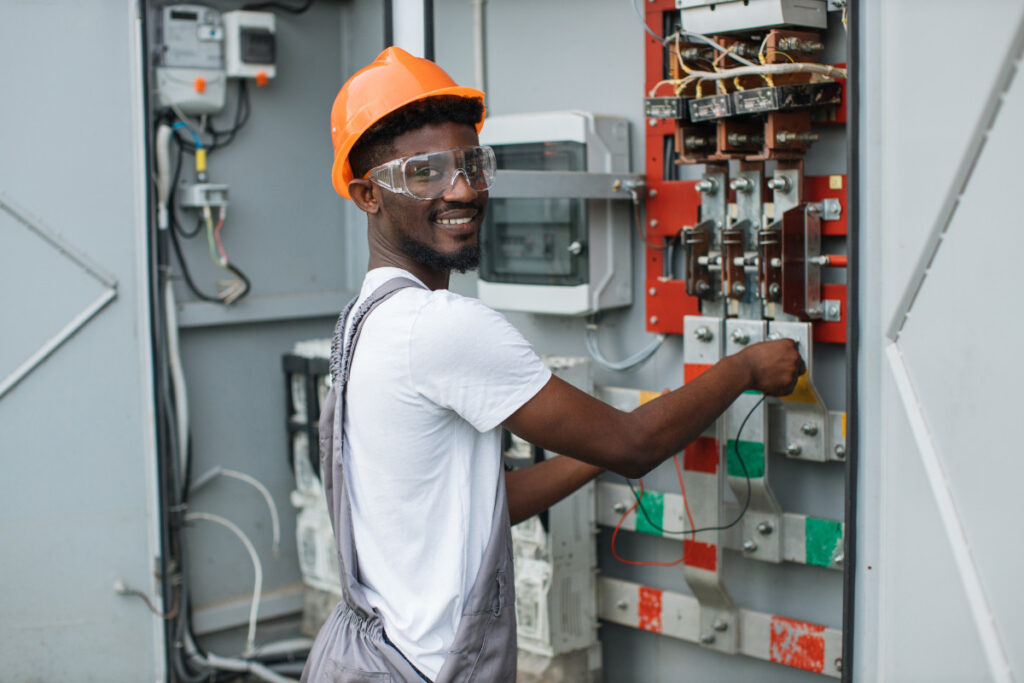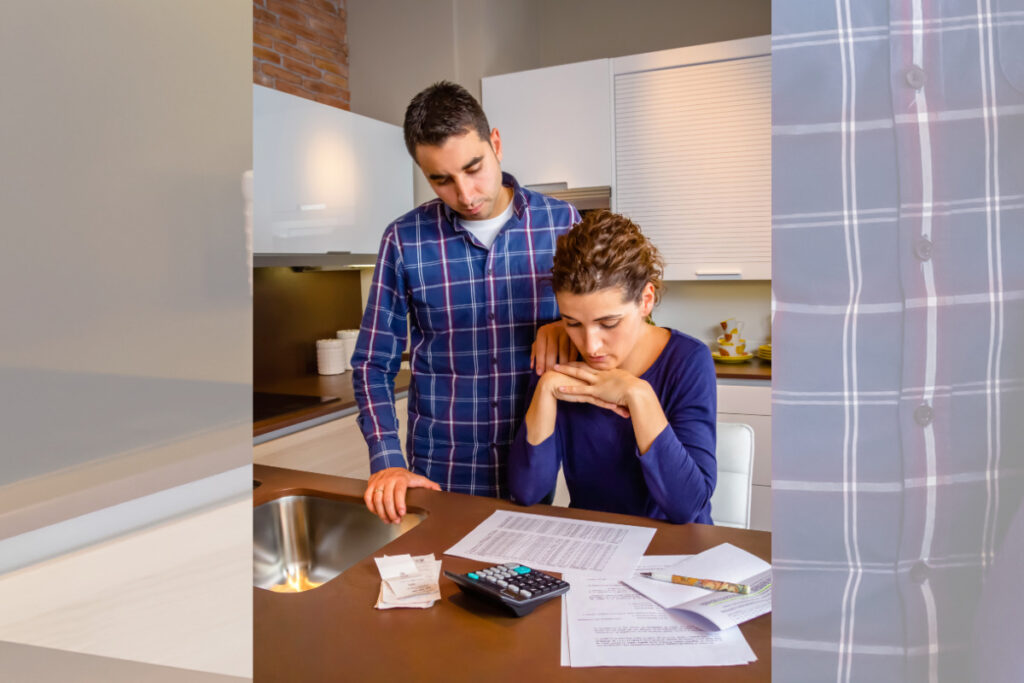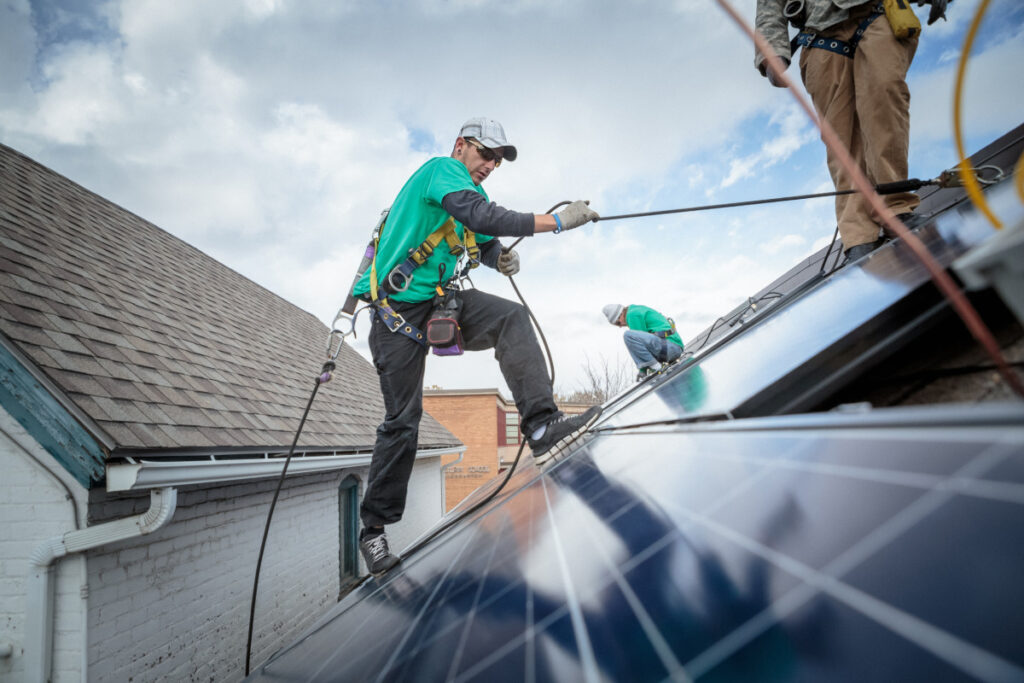Introduction
Going off-grid with solar panels may seem like an eco-friendly and cost-saving solution to our growing energy needs. But it’s not without its challenges. We must plan carefully to transition into a self-sufficient, renewable power source. We must invest in proper equipment and adapt our energy usage habits. This requires active participation and commitment from everyone.
This blog will take you through the misconceptions about going off-grid with solar panels. It will discuss the effort and costs involved in making this lifestyle shift.
| Key Takeaways |
|---|
| Going off-grid with solar panels requires careful planning, investment in proper equipment, and adaptation of energy usage habits. |
| Assessing energy needs and usage is crucial before designing and sizing an off-grid solar system. |
| Obtaining permits and approvals, installing and maintaining the system, batteries, location, installation, and maintenance costs are some factors that increase the cost of going off-grid with solar panels. |
| Best practices for successful off-grid living include conducting a thorough energy audit, working with a reputable installer, optimizing energy efficiency by upgrading appliances/devices to consume less power or use LED lighting, etc., and considering group or solar community projects, among others. |
What Is Off-Grid Solar Power?
Off-grid solar power is an autonomous system that runs on solar panels and batteries, allowing homeowners to disconnect entirely from their utility company’s electrical supply.
The Misconception Of Going Off-Grid
There is a common misconception that having solar panels on your home automatically means you’re living off the grid. Most solar-powered homes are connected to their local utility company’s electrical supply for several reasons.
Another contributing factor to this confusion lies in the prevalence of net metering policies. Net metering allows homeowners with solar panels to send their excess generated electricity back into the grid and receive credit from the utility company.
This creates an interconnected relationship between the homeowner’s solar system and the larger electrical grid, leading some people to mistakenly believe they are entirely off-grid while using only their renewable energy source when they’re still connected.
The Relationship Between Solar Power And The Grid
To understand going off-grid with solar panels, it’s crucial to grasp the relationship between solar power and the grid. Solar panels generate Direct Current (DC) electricity, converted into Alternating Current (AC) electricity by an inverter before powering your home electrical appliances.
However, solar systems connected to the grid use a two-way utility meter that sends energy back and forth between your house and the utility company.
When your solar system produces more energy than your home can use, the extra power is sold back to the grid through net metering. Net metering allows homeowners with grid-tied solar panel systems to earn credits on their utility bills for any excess electricity they produce and feed back into the grid.
The Challenges Of Going Off-Grid With Solar Panels
Designing and sizing the solar system, obtaining permits and approvals, and installing and maintaining the equipment are some of the challenges of going off-grid with solar panels.
Assessing Energy Needs And Usage
Assessing your energy needs and usage before going off-grid with solar panels is crucial. Here are some factors to consider:
- Number of occupants: Consider the number of people in your home, which will help determine the power needed.
- Appliances: Make a list of all the devices you use, including their wattage and frequency of usage.
- Energy consumption: Review your electricity bills to determine how much energy you consume daily or monthly.
- Climate conditions: Your location’s climate conditions will impact the sunlight available and how much energy your panels can generate.
- Backup power needs: Determine if you’ll need backup power, such as a generator or additional battery storage, to cover periods when solar production is low.
- Plans: Consider projects that may increase or decrease energy needs, such as adding new appliances or downsizing your home.
By carefully assessing your energy needs and usage, you can design an off-grid solar system that meets your specific requirements while limiting excess costs.
Designing And Sizing The Solar System
Designing and sizing your off-grid solar system is crucial to ensure it meets your energy needs. Here are some factors to consider:
- Conduct a thorough energy audit to determine your energy usage.
- Choose high-quality, efficient solar panels that withstand harsh weather conditions.
- Consider the orientation and angle of your solar panels for optimal performance.
- Calculate the battery capacity based on your daily power usage and the days you want your system to run without sunlight.
- Choose an appropriate inverter size for household use to convert DC power from solar panels to AC power.
- Ensure proper wiring and grounding for safety and efficient operation.
- Allow room for future expansion or upgrades as your energy needs grow.
By carefully designing and sizing your off-grid solar system, you can maximize efficiency, minimize costs, and enjoy sustainable energy independence.
Obtaining Permits And Approvals
Before installing an off-grid solar system, homeowners must obtain permits and approvals from local authorities. These requirements vary by location, but some common ones include building permits, electrical inspections, and zoning regulations.
Failure to obtain the necessary permits can result in fines or legal issues.
Not only does obtaining permits add to the overall cost of going off-grid with solar panels, but it also adds time to the installation process. However, complying with these regulations is essential for safety reasons and ensures your system is up to code.
In addition, some states offer financial incentives for homeowners who install solar systems that comply with their guidelines.
Installing And Maintaining The System
To go off-grid with solar panels, installing and maintaining the system requires careful consideration. Here are some essential steps to follow:
- Hire a reputable licensed installer to ensure proper installation, safety, and warranty protection.
- Choose the right location for optimal sunlight exposure and minimal shading.
- Securely install the mounting racks or frames onto your roof or property.
- Use appropriate wiring and materials to connect the solar panels to the inverter.
- Install appropriate safety equipment such as circuit breakers, grounding wires, and surge protectors.
- Monitor your solar system’s performance, including energy production and battery storage levels.
- Clean solar panels periodically to prevent dirt buildup that can decrease efficiency.
- Replace batteries when needed to maintain energy storage capacity.
- Schedule routine maintenance checks by a qualified technician to ensure the long-term sustainability of components.
Proper installation and regular maintenance are essential for getting the most out of your off-grid solar system. With good care, you can enjoy reliable, clean energy for years.
Factors That Increase The Costs
Going off-grid with solar panels can be an attractive option for those wanting to reduce their reliance on utilities and promote a more sustainable lifestyle. However, several factors can increase the costs of transitioning to an off-grid solar system.
| Factor | Description |
|---|---|
| Batteries | Batteries are necessary for storing energy generated by solar panels for later use, but they can be expensive, especially when opting for high-capacity and long-lasting options. |
| Permits and Approvals | Depending on local regulations, you may need various permits and approvals before installing your solar system, which can add to the overall cost. |
| System Sizing | The size of the solar system required to meet your energy needs will directly impact the cost of the system, with larger systems requiring more panels and equipment. |
| Installation and Maintenance | Professional installation and ongoing solar system maintenance can be costly, especially if your property is in a remote location or has unique requirements. |
| Energy Efficiency | If your home is not optimized for energy efficiency, you may need to invest in upgrades such as better insulation, energy-efficient appliances, or innovative home technology to ensure your solar system can meet your energy needs. |
| Location | Areas with more sunlight will require fewer solar panels to generate the same amount of energy as those with less sunlight. This can impact the overall cost of the solar system. |
| Backup Power Source | Depending on your energy needs and location, you may need to invest in a backup power source, such as a generator, when your solar system isn't producing enough energy. |
While going off-grid with solar panels can be challenging and costly, it is essential to remember that the long-term benefits of energy independence, sustainability, and financial savings can outweigh the upfront costs for many homeowners.
Best Practices For Going Off-Grid With Solar Panels
Optimizing energy efficiency, working with a reputable solar installer, and considering group or community solar projects are some of the best practices for achieving successful off-grid living with solar panels.
Conducting A Thorough Energy Audit
Conduct a thorough energy audit to ensure your off-grid solar system is appropriately sized. This involves an analysis of your household’s energy usage and needs. Here are some steps to take:
- Review Your Energy Bills – Find out your current monthly energy usage on average.
- Identify Energy Hogs – Look for appliances or devices that consume the most power in your home.
- Determine Power Needs– Decide which appliances you want to run using solar power and calculate their power needs.
- Assess Your Roof Space – Check if you have enough roof space to install the appropriate solar panels to generate enough power for your home.
- Choose Efficient Appliances – Opt for high-efficiency appliances and lights as they use less power than standard ones.
By conducting a thorough energy audit, you can determine the right-sized solar system needed for your off-grid living needs. Not only will this help you save money on electricity bills, but it will also reduce your carbon footprint and encourage sustainable living habits.
Working With A Reputable Solar Installer
Working with a reputable solar installer is crucial when going off-grid with solar panels. An experienced and qualified professional can help design and size the system properly, obtain permits and approvals, install the components efficiently, and maintain the system to ensure optimal performance.
To find a reliable solar installer, do thorough research by checking their credentials, experience level, and online reviews from previous customers. You can also ask for references or recommendations from friends or colleagues with similar systems installed in their homes.
Optimizing Energy Efficiency
Optimizing energy efficiency is crucial to maximizing the benefits of going off-grid with solar panels. Here are some ways to achieve this:
- Upgrade home appliances and devices – Appliances that consume less energy can help reduce the power the solar system uses.
- Use LED lighting – LED light bulbs have a longer lifespan and use less electricity than traditional incandescent bulbs.
- Insulate your home – Properly insulating the walls, ceiling, and floors can help retain heat in winter and keep cool air in during summer.
- Implement intelligent home technology – Smart thermostats and automated systems can adjust temperature settings to optimize energy usage based on occupancy patterns.
- Conduct regular maintenance checks – Regularly cleaning solar panels, maintaining battery charge levels, and promptly fixing any damages can improve overall efficiency.
- Invest in energy-efficient windows – Upgrading windows to double-paned or low-E glass can reduce heat loss during winter months while blocking heat gain during hot seasons.
By implementing these practices, homeowners can optimize their energy efficiency, increase savings, reduce their carbon footprint, and enjoy sustained benefits from going off-grid with solar panels.
Considering Group Or Community Solar Projects
If you’re considering going off-grid with solar panels, consider joining a group or community solar project.
Group or community solar projects offer several benefits over individual installations. First, they require less equipment and thus are typically more cost-effective than standalone systems.
Second, sharing the installation and maintenance costs among group members further reduces expenses.
Joining a group or community solar project is an excellent way to enjoy the benefits of renewable energy while mitigating some of the challenges involved in going off-grid independently.
Overcoming The Challenges And Reducing The Costs Of Going Off-Grid With Solar Panels
To reduce costs, maintain batteries, manage energy, and choose the right panels. Consider alternative sources and optimize solar efficiency.
Proper Battery Maintenance And Replacement
Maintaining and replacing batteries is crucial for off-grid solar systems to function efficiently. Here are some best practices for proper battery maintenance and replacement:
- Regularly check the water levels in lead-acid batteries and refill them with distilled water when needed.
- Keep the battery bank clean and free from debris to prevent heat buildup, which can damage the system.
- Install a battery monitoring system to keep track of battery performance and detect any issues early on.
- Consider investing in high-quality batteries with a longer lifespan and better performance.
- Have a backup plan in case of power outages or emergencies, such as using a generator or having spare batteries on hand.
- Replace old or worn-out batteries before they fail to prevent damage to the entire system.
- Dispose of old batteries properly by following local regulations.
Proper battery maintenance and replacement can extend the life of off-grid solar systems, reduce costs, and improve energy efficiency. Investing in high-quality batteries is worth considering despite the initial expense. It can save money while maintaining an eco-friendly lifestyle through renewable energy sources like solar power.

Energy Management And Storage
One of the challenges of going off-grid with solar panels is managing and storing energy. When designing an off-grid solar system, it’s essential to consider how much energy your household uses daily.
This involves conducting a thorough energy audit to determine your electricity needs so you can design a system that meets those requirements. Once you’ve established this baseline, you’ll need to decide how much battery storage capacity is necessary when there isn’t enough sunlight to generate power.
It’s essential to consider other factors, such as choosing the right solar panels and alternative sources like wind turbines or generators, to optimize energy efficiency.
Some homeowners may also choose group or community-based projects that enable them to share resources and reduce costs while living off-grid.
Choosing The Right Solar Panels
Choosing the right solar panels is crucial when going off-grid with solar power. The efficiency and durability of solar panels play an important role in determining the success of your off-grid system.
Monocrystalline panels are more expensive but are known for their higher efficiency rate, making them ideal for those with. Considering all available alternative energy sources when planning an off-grid system is essential to limited roof space or prefer a minor system.
On the other hand, polycrystalline panels may be less efficient than monocrystalline panels but are generally more affordable and can still provide enough energy for your off-grid needs.
Additionally, it’s not just about choosing which type of panel to use; you also need to ensure it fits your energy requirements and usage patterns.
Choosing adequate solar panels is critical when building an effective off-grid system that provides long-term savings while reducing its carbon footprint.
Alternative Energy Sources
In addition to solar power, alternative energy sources can be used for off-grid living. Wind turbines and hydroelectric systems are popular options that can be used with solar panels.
Another option is biomass energy, which involves burning organic materials like wood chips or plant waste to produce heat and electricity.
Considering all available alternative energy sources when planning an off-grid system is important.
Conclusion
Going off the grid with solar panels is a complex undertaking that requires significant effort and costs. However, it offers energy independence, savings on monthly bills, and environmental benefits in the long run.
Thorough audits, working with reputable installers, and optimizing efficiency are essential for going off-grid. Consider group or community solar projects.
Reduce costs and maximize productivity by overcoming challenges with proper maintenance and panel selection.
Installation may need additional expenses; however, long-term savings and reduced carbon footprints offset these costs.
DroneQuote: your trusted solar partner
Join the movement towards a sustainable future by exploring the misconceptions of going off-grid with solar panels. Plan carefully and invest in proper equipment with DroneQuote as your solar partner. Receive honest feedback and make informed decisions toward a self-sufficient lifestyle.
FAQ
- What are the challenges of going off-grid with solar panels?
Going off-grid with solar panels can be challenging due to several factors, including high upfront costs, limited energy storage capacity, and maintenance requirements. Additionally, unpredictable weather patterns and changing regulations may impact the efficiency and effectiveness of solar power systems.
- How much does it cost to go off-grid with solar panels?
The cost of going off-grid with solar panels depends on numerous factors, such as the size of the system required by your household’s demand and potential backup solutions needed during unfavorable weather conditions or low sunlight seasons (i.e., generators). Generally speaking – depending upon location & individual needs: prices typically range anywhere from $10k up to six-digit figures for large-scale projects.
- How do I determine if my home is suitable for an off-grid solar panel system?
To determine compatibility, consider usage, space, and climate. Also, check utility services and infrastructure compliance. Don’t violate rules when cutting ties with the grid. Ensure necessary infrastructure work is completed. This allows for a smooth transition to solar power.
- Despite all these challenges, is it worth going off-grid with solar panels?
Don’t be fooled by the hype – going off-grid isn’t easy! Various factors affect the decision: living situation, finances, and consumption goals. Independence and sustainability drive individuals to sacrifice utility reliability. Alternative sources may be necessary to achieve desired outcomes. Strategic planning benefits present and future generations while reducing carbon footprints. Learn about the costs and challenges involved in switching to solar energy.







[…] Are you tired of your rising energy bills and keen on exploring sustainable alternatives? Curious about how you can maximize your energy production and consumption at the same time? Are you aware that the sun produces enough energy in an hour to power our planet for a year? Have you heard of off-grid solar panels? […]